Vision changes: what to watch for and drug risks
Vision changes aren't always a sign of an eye disease. Sometimes they come from medicines, allergies, or simple dehydration. Knowing which signs are urgent and which ones can wait saves sight and stress.
Certain drugs commonly used in our articles can affect vision. Hydroxychloroquine, often taken by people with lupus, can damage the retina after long use. If you're on hydroxychloroquine, get a baseline eye exam and yearly monitoring after five years or sooner if your dose is high. Steroid pills like prednisone can raise eye pressure and speed up cataract formation; ask your doctor about eye checks if you take them long term. Antihistamines and some antipsychotics can cause dry eyes and blurred vision—these effects usually improve after stopping the drug but check first with your prescriber.
How to tell if a vision change is urgent. Seek emergency care for sudden loss of vision in one or both eyes, new double vision, flashes of light with many new floaters, or severe eye pain with nausea. These signs can mean retinal detachment, stroke, or acute glaucoma. For gradual changes like slowly worsening blur, halos at night, or new difficulty reading, book an ophthalmology appointment within a few days to weeks depending on severity.
Practical steps you can take right now. If your vision feels off, note when it started, what you were doing, and any medicines you recently started or changed. Don't stop prescribed medicines without talking to your doctor. If you suspect a medication side effect, call your prescriber and ask whether testing or a dose change is safer than stopping.
When to worry about online medicine sources. Buying drugs from unverified online pharmacies risks counterfeit or inappropriate doses that can cause vision problems. Use reputable services that check prescriptions and show clear contact info. Our reviews and pharmacy guides can help you pick safer options.
How doctors check drug-related risk. Eye doctors use visual fields, optical coherence tomography, and retinal photos to spot early damage from drugs like hydroxychloroquine. For steroid-related pressure issues, they measure intraocular pressure and look at the optic nerve. Early detection often prevents permanent loss.
Small daily habits help too. Blink often when using screens, adjust screen brightness, and take a 20-20-20 break—every 20 minutes look at something 20 feet away. Use artificial tears for mild dryness, but if redness or pain follows, see a doctor. If you wear contact lenses and notice blurred vision, remove them and rinse; don't sleep in lenses unless approved. Keep a list of all prescription and over-the-counter drugs, including eye drops, and bring it to every clinic or eye visit. That simple list can reveal a drug link faster than guessing, and it makes conversations with pharmacists and doctors quicker.
The Connection Between Pramipexole and Vision Changes
Alright folks, buckle up because we're diving into a wild topic today. You ever heard of Pramipexole? It's a drug that's often used to treat Parkinson's disease and restless legs syndrome, and it's been causing quite a stir lately. Now, don't worry, it's not because of any zombie-like side effects, but rather because it seems to have a link to vision changes. Yes, you heard it right, this little pill might just be meddling with our peepers. It's a crazy world we live in, isn't it?
VIEW MORE
